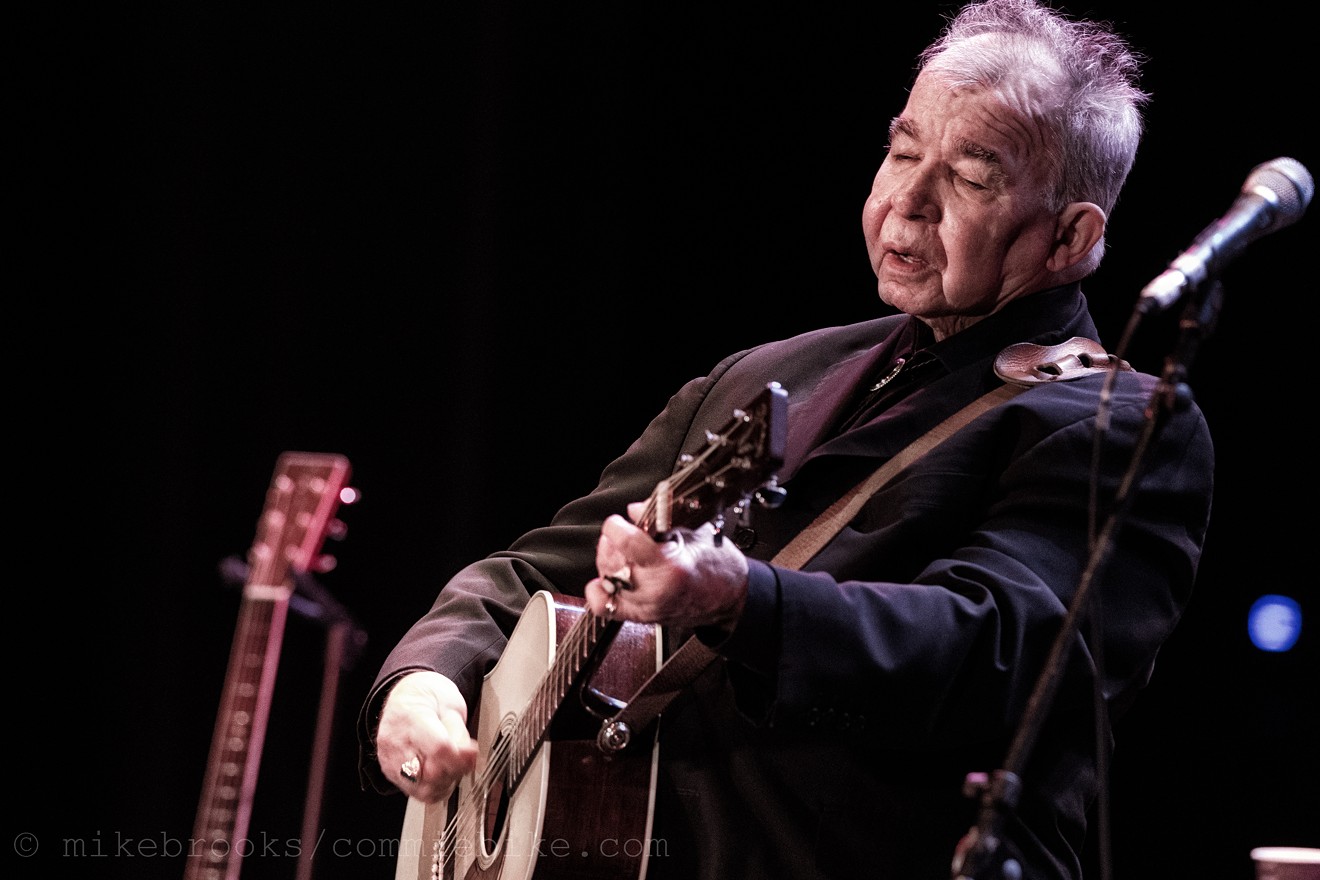John Prine has a hell of a sense of humor. Spend a couple of hours in the same room with the guy, and it's hard to come away feeling any different. He's one of America's greatest purveyors of sad songs — the greatest, quite possibly — but that doesn't mean he can't take or deliver a joke.
"This one's kind of a sad song, but I like a sad song every so often, if you couldn't tell," Prine deadpanned to a packed room at the Winspear Opera House in Dallas on Friday night as he prepared to sing "Summer's End," a track off his new album, The Tree of Forgiveness. Pausing briefly to strum his guitar, he added, "I might have to get a job selling Kleenex."
"Summer's End" is indeed sad, but in a beautiful, inscrutable way. A song about endings, it's also about beginnings — or, at least, the prospect of beginnings. At 71, Prine has fewer beginnings ahead than endings, a fact that you can hear in every one of the scraggly, blown-out notes he sings. Frailty and proximity to death are what give the music its weightless, uplifting quality."I might have to get a job selling Kleenex." – John Prine
tweet this
While it may be a little late for a career change, 2018 has very much been a new beginning for this onetime paperboy, the blue-collar son of a steel worker from the north side of Chicago. The Tree of Forgiveness, released in April, was his first collection of new songs since 2005. ("Already? It's only been 13 years," he quipped during the show.) It's also his most successful record, first-ever No. 1 (on the folk chart) and first to crack the Top 20 on the Billboard 200.
Not that such things have ever been an adequate means of measuring the man or his work. Prine, joined by a four-piece band Friday night and, on select songs in the second half of the set, by opener Amanda Shires, spent much of the show with the image of a craggy, gnarled tree projected behind him on a backdrop at the rear of the stage. He is, in many ways, like that tree, tough, weathered and resolute, which shows in his own wrinkled features, each line the year of a tough-lived life.
Prine's songs aren't so much about what he says as what he implies. Likewise, they don't sting because they're sad but because they aren't just sad. The capacity for happiness, hope or humor in his world is inextricably linked with its polar opposite, with its own lack. When Prine introduced "Summer's End," he dedicated it to a single mother in the crowd named Jessica Smith, and you couldn't help conjure a character from one of his songs.
Spareness has always been a strength of Prine's music, but there's a power that it gains at this juncture in his career. To say that his show at Winspear was a great one would be a bit of a misstatement. But it was certainly touching and at times heartbreaking, due in part to its very limitations. Prine's voice couldn't hit very many notes, particularly on older songs meant for higher registers.
"I've only got two gears in my voice, and one of 'em is stripped," he teased at one point.
Paradoxically, Prine could've carried the entire show on his own, without another musician ever joining him onstage. It would have been a harrowing listen, but the middle interlude, in which he played solo, proved just how moving and expressive that beaten, battered voice could be. If anything, the musical accompaniment tended to obscure that, but his duets with Shires, particularly on his early period gem "Clocks and Spoons," were delightfully playful, especially as the pair bantered midsong.
Yet Prine's banter was the hardest thing of all to peg down. He often set up his songs by spinning a yarn, be it about a humorously unsuccessful fishing trip or his outrage over Pluto losing its status as a planet. The songs invariably played out with near-identical details to his stories, as though he'd shown his hand. Were the stories a lie, or were his songs that literal? The Pluto lyric, in particular, from the song "Lonesome Friends of Science," revealed an absurd, cerebral bit of free association, but the lines between artful and artless, fact and fiction were hopelessly blurred.
Rather, they were deliberately blurred, for Prine — who brought out his wife, Fiona, during the encore — was always one step ahead of the game. "Lake Marie," which closed out the main set, was a break from everything that came before it, a soaring singalong with not a note out of place while Prine delivered his verses with an ad-libbed, off-the-cuff timing. Then, as though to appease the gods for one more night, he slipped off his guitar, did a jig and danced his way offstage, hamming it up to the very end.
Set List:
"Six O'Clock News
"Knockin' on Your Screen Door"
'Bruised Orange (Chain of Sorrow)"
"Your Flag Decal Won't Get You Into Heaven Anymore"
"Caravan of Fools"
"Eggs & Daughter Nite, Lincoln Nebraska, 1967 (Crazy Bone)"
"Grandpa Was a Carpenter"
"Hello in There"
"Boundless Love"
"Summer's End"
"I Have Met My Love Today"
"Lonesome Friends of Science"
"Angel From Montgomery"
"Donald and Lydia"
"Souvenirs"
"That's the Way That the World Goes 'Round"
"No Ordinary Blue"
"In Spite of Ourselves" (with Amanda Shires)
"Clocks and Spoons" (with Amanda Shires)
"Sam Stone"
"God Only Knows" (with Amanda Shires)
"Lake Marie" (with Amanda Shires)
Encore:
"When I Get to Heaven" (with Amanda Shires)
"Paradise" (with Amanda Shires and Fiona Prine)












